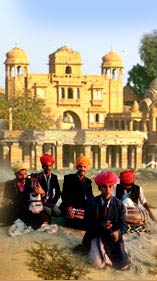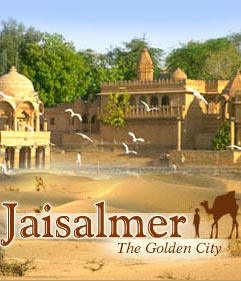The History of Jaisalmer has a charm of its own. Like
all other cities of Rajasthan, Jaisalmer too has its own glorious past
to boast about. History of Jaisalmer draws heavily from the history of
the Rajputana. The city is said to be founded by one Raja Rawal Jaisal,
a Bhatti Rajput ruler, in approximately 1156 A D. Legends go by that he
did it on the behest of a local hermit named Eesaal. The raja choose
Trikut hill as the new site for his fort. This was because he thought
that his previous abode at Luderwa (16 km from present Jaisalmer) was
vulnerable towards possible enemy assault.
In medieval times, Jaisalmer continued to be on the focus of the masses
because of its location. It falls in the way of one of the two routes,
which connected India from Persia, Egypt, Africa and the west. The
Bhatti Rajput rulers were still in line. They were the sole guardian of
the city and thus mustered enough wealth through taxes levied on the
passing caravans, of which there was no scarcity.
For many years Jaisalmer remained out of bound from the foreign rulers
partly because of its location and partly because of its relief. In the
mid Thirteenth century, Ala-ud-din Khilji, the Turk-Afghan ruler of
Delhi laid the siege over the city. He was apparently upset with the
Bhatti Rajput rulers because they stopped and looted one of his caravans
containing royal coffer which was on its way to Sind. The siege lasted
for around 9 long years and when the fall seemed eminent the Rajput
womenfolk of the city committed Jauhar (self Immolation to avoid
disgrace).
It is said that Duda, the son of Raja Jaisimha, fought vehemently in the
battle but was overpowered after the fierce hand to hand combat. He died
fighting. His descendants continued to rule the city. Though they had a
cordial relation with the Mughal rulers in Delhi, they fought
unsuccessfully with Emperor Humayun. Emperor Shah Jahan gave the right
of governance to Sabala Simha, who had the royal patronage and had shown
remarkable valor to win the Battle of Peshawar.
In the modern era, Jaisalmer was still a tough nut to crack and was the
last among the Rajputana royals to sign the 'Instrument of Agreement'
with the British establishment. Even that was achieved after long hours
on the negotiation table and after much cajoling from the British
establishment in India. In the year 1947, royals signed the agreement to
remain in just independent India. Since then it has developed itself
into a major tourist destination as well as a cultural hub of the
western India.
The history and origin of Jaisalmer City is an
integral part of the History of Rajasthan.
Jaisalmer : History of Jaisalmer City






